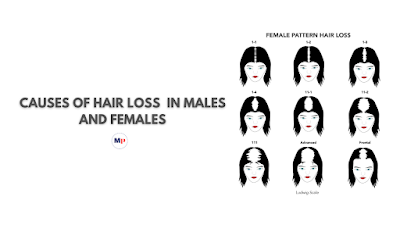CAUSES OF HAIR LOSS IN FEMALES| CAUSES OF HAIR LOSS IN MALES| CAUSES OF HAIR LOSS AND BREAKAGE| CAUSES OF HAIR LOSS AT YOUNG AGE| CAUSES OF HAIR LOSS AND ITCHY SCALP
Hair loss, medically known as alopecia, can have several causes, and it can affect both men and women. It's important to note that some degree of hair shedding is normal, and everyone loses hair daily. However, excessive hair loss can be attributed to various factors, including:
1. Genetics (Androgenetic Alopecia):
This is the most common cause of hair loss, often referred to as male-pattern baldness (in men) or female-pattern baldness (in women). It's primarily determined by genetics and hormonal changes, and it tends to follow a predictable pattern of hair thinning and loss.
2. Hormonal Changes:
Hormonal Imbalance: Changes in hormone levels, such as during pregnancy, childbirth, menopause, or thyroid disorders, can contribute to hair loss.
Dihydrotestosterone(DHT): An androgen hormone derived from testosterone, DHT can shrink hair follicles, leading to thinner and shorter hair, especially in individuals with a genetic predisposition.
3. Medical Conditions:
Alopecia Areata: An autoimmune disease where the immune system attacks hair follicles, resulting in patchy hair loss.
Scalp Infections: Fungal or bacterial infections of the scalp can damage hair follicles and cause hair loss.
Trichotillomania: A psychological condition characterized by compulsive hair-pulling that can lead to hair loss.
4. Medications and Treatments:
Chemotherapy: Cancer treatment drugs can cause rapid hair loss, although this is usually temporary, and hair often regrows after treatment.
Medications: Some drugs used for conditions like cancer, high blood pressure, depression, and arthritis may cause hair loss as a side effect.
5. Physical and Emotional Stress:
Telogen Effluvium: Severe stress, surgery or significant weight loss can push more hair follicles into the resting phase, causing increased shedding.
Emotional Stress: High levels of emotional stress can exacerbate hair loss in those with a genetic predisposition.
6. Nutritional Deficiencies:
Inadequate intake of certain nutrients, particularly iron, zinc, vitamin D, and biotin, can lead to hair thinning and loss.
7. Hairstyling Practices:
Tight Hairstyles: Wearing tight hairstyles like braids, cornrows, or ponytails regularly can cause a type of hair loss called traction alopecia.
Heat and Chemicals: Excessive use of hair straighteners, curling irons, and harsh chemicals can damage hair and lead to breakage.
8. Aging:
As people age, hair naturally becomes thinner and may start to recede. This is a normal part of the aging process.
9. Environmental Factors:
Exposure to pollutants, UV radiation, and other environmental toxins can damage hair and contribute to hair loss.
10. Poor Scalp Health:
An unhealthy scalp, often due to conditions like dandruff or psoriasis, can compromise hair follicles and lead to hair loss.
The causes of hair loss can be complex, and often multiple factors may contribute simultaneously. If you're experiencing significant hair loss and are concerned about it, it's advisable to consult a healthcare professional or dermatologist who can help determine the underlying cause and recommend appropriate treatments or interventions. Early intervention can often yield better results in managing hair loss.
RELATED TOPIC
How To Stop Hair Fall Immediately
Best Natural Remedies for Hair Loss





